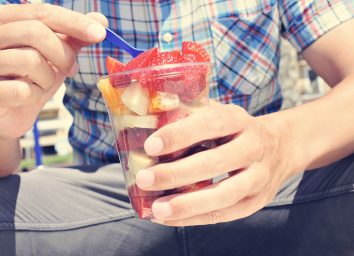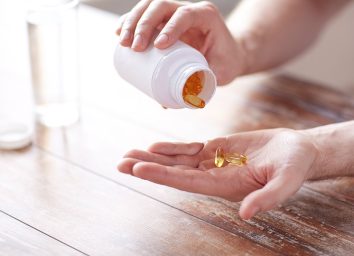18 Best Carbs for Men to Help You Lose Weight
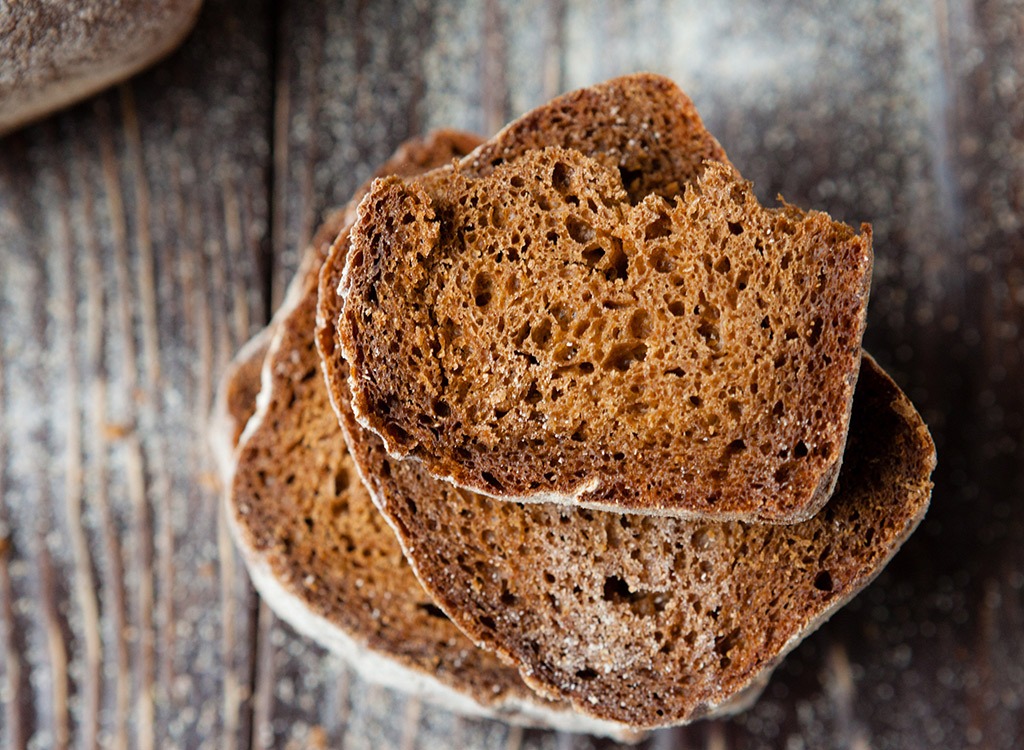
If you've tried sticking to a low carb eating plan like the ketogenic diet you know how challenging it can be to limit yourself to 20 grams of carbs a day, especially if you are a guy who grew up on Wonder Bread. Twenty grams; that's small potatoes, technically one a small potato or a half a bagel or a couple of meager whirls of spaghetti on your fork. Those are the classic carbohydrates that many people still think of when weighing the pros and cons of going low carb. However, a lot of the foods we eat have carbohydrates in them—like these best carbs for men. Which is why we rounded up a list of healthy carbs to consider in your diet.
"There is still some misconception about the role of carbohydrates in a healthy diet," Frank Hu, MD, PhD, a professor of epidemiology and nutrition at Harvard Medical School, told The Atlantic. "Some people still believe that all carbohydrates are bad, and some people still promote a very low carbohydrate diet without strong scientific support."
Take it from Dr. Hu, a world-renowned epidemiologist and nutrition expert: Don't fear carbs. Eat 'em. Prioritize these, the healthiest carbs for men, listed here alphabetically. And for more healthy eating tips, be sure to check out our list of 21 Best Healthy Cooking Hacks of All Time.
Acorn Squash
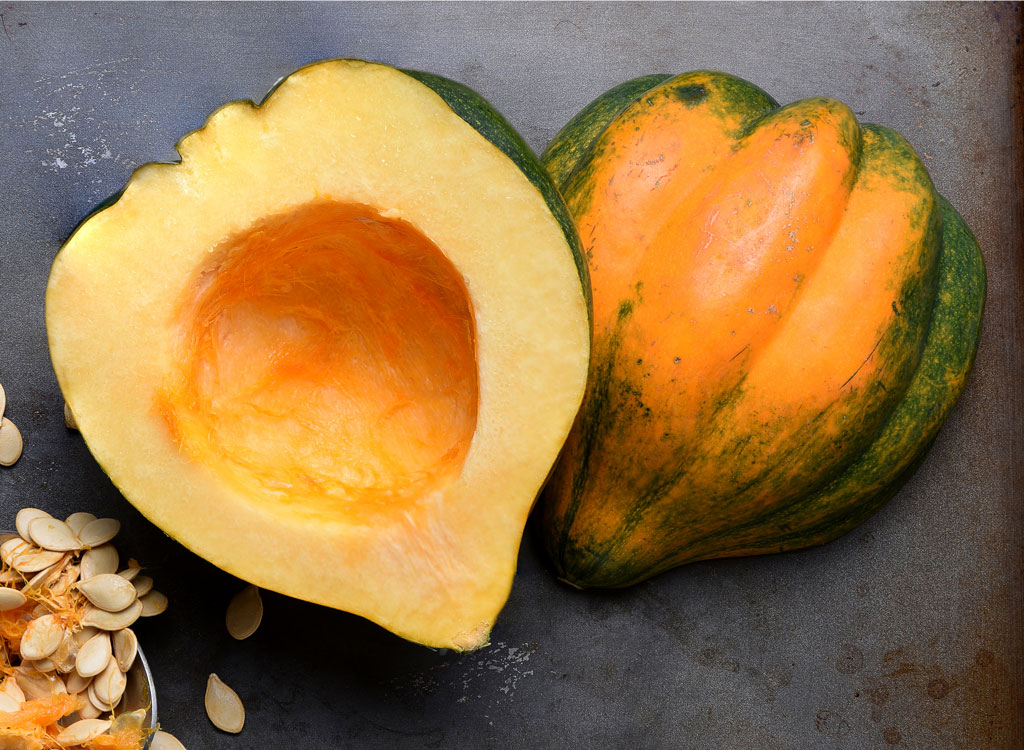
This naturally sweet veggie delivers 15 carbohydrates in a one-cup serving, along with 2 grams of dietary fiber. Plus, acorn squash gives you 25% of your vitamin C needs for the day and also has a good amount of vitamin A which includes carotenoid antioxidants that protect against eye, heart, and metabolic conditions.
Incorporate even more beta-carotene rich foods into your diet with our list of The 12 Best Vitamin A Foods For Skin, Hair, and Eye Health.
Apples
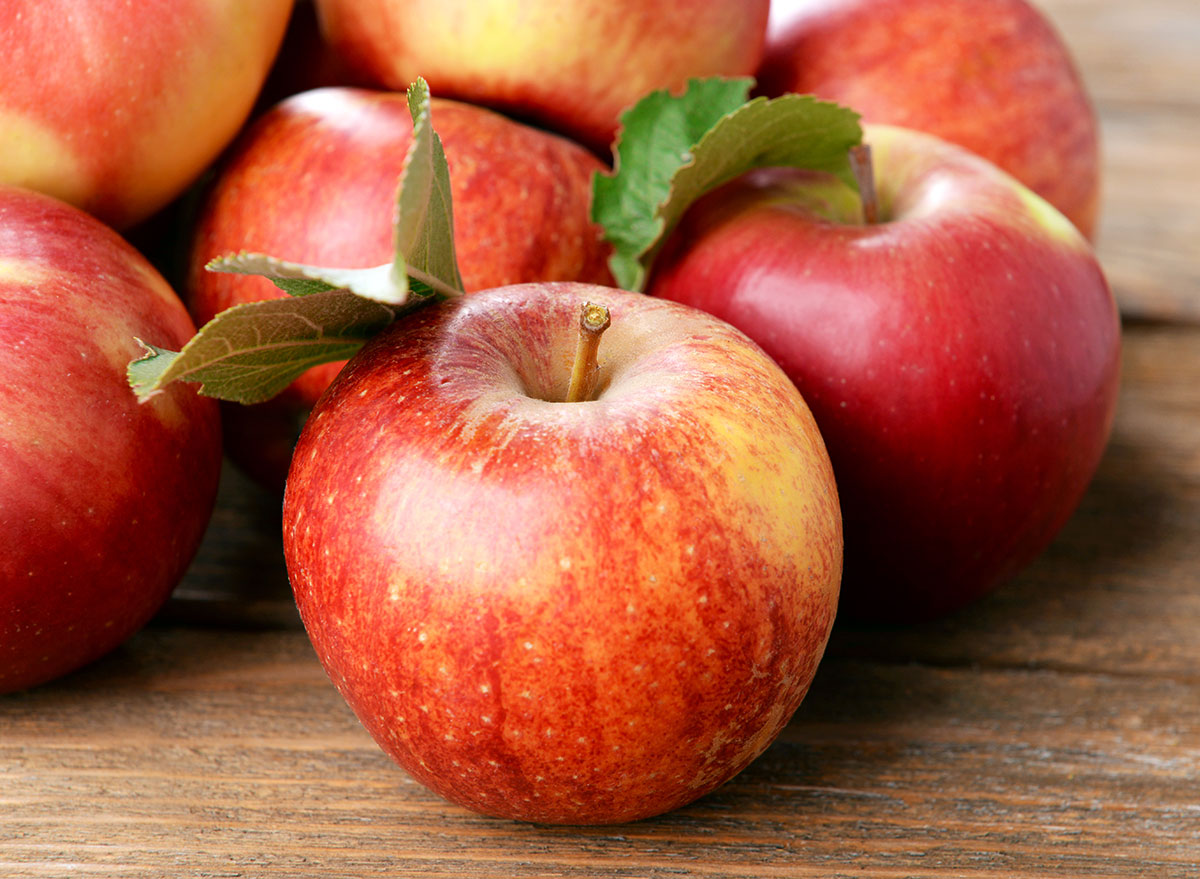
An apple a day is a good way to get brain-boosting carbohydrates and a ton of nutritional extras—25 grams of carbs for one medium-sized apple. For one, eating the skin and pulp of a whole medium apple delivers 4.4 grams of fiber. A study in BMJ linked eating apples, to a lower risk of type 2 diabetes. And scientists have recently calculated the antioxidant power of apples to be equal to more than 1,500 milligrams of vitamin C. You can even start cooking with those apples with our list of 25 Delicious Apple Recipes.
Artichoke Hearts
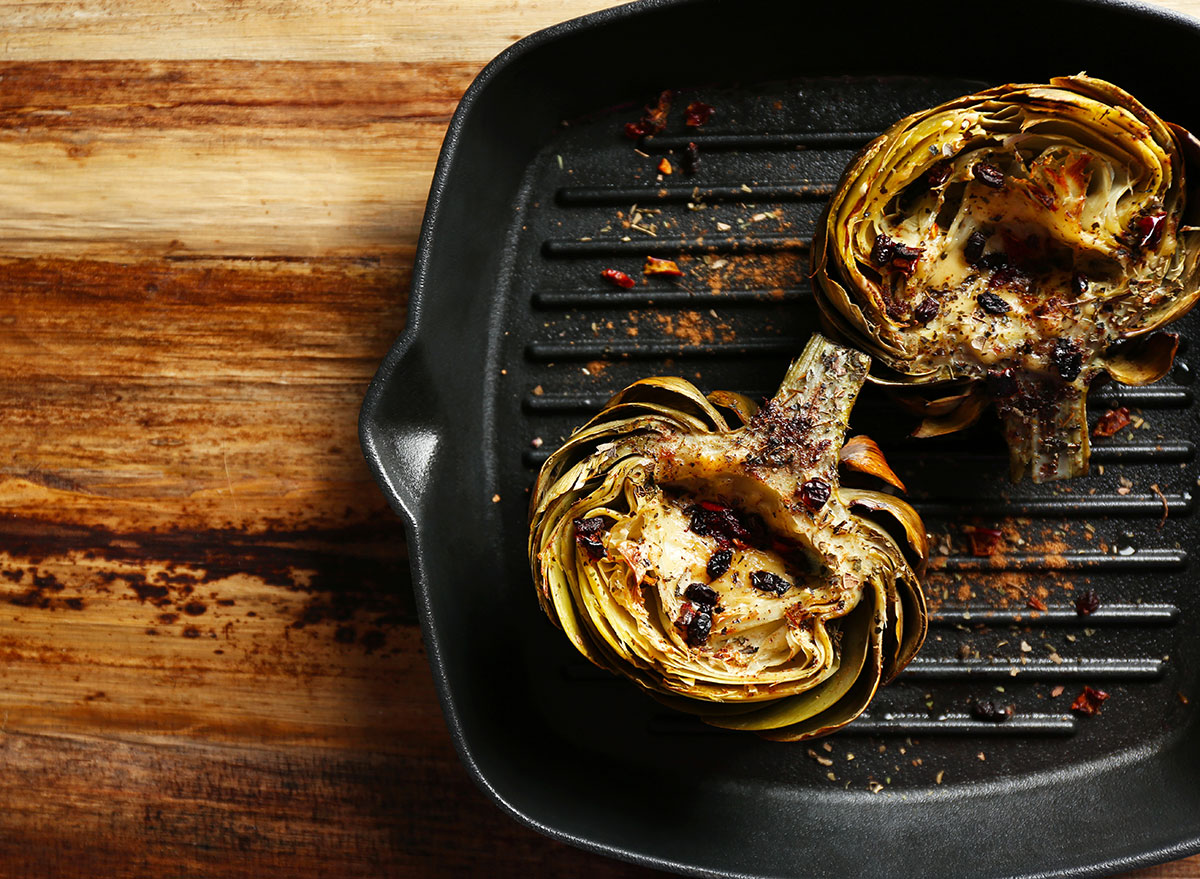
Eat an entire medium-sized artichoke for only 60 calories, and you're getting 13 grams of carbohydrates in your meal! Plus, with 7 grams of dietary fiber per serving (which is 28% of your daily intake), artichokes are certainly one of the best carbs for men. This vegetable makes a light yet tasty and filling addition to salads and chickpea or lentil pasta. Or you can even try them on our Spanish-Style Pizza Recipe with Romesco Sauce, Spinach, and Artichoke Hearts.
Black Beans
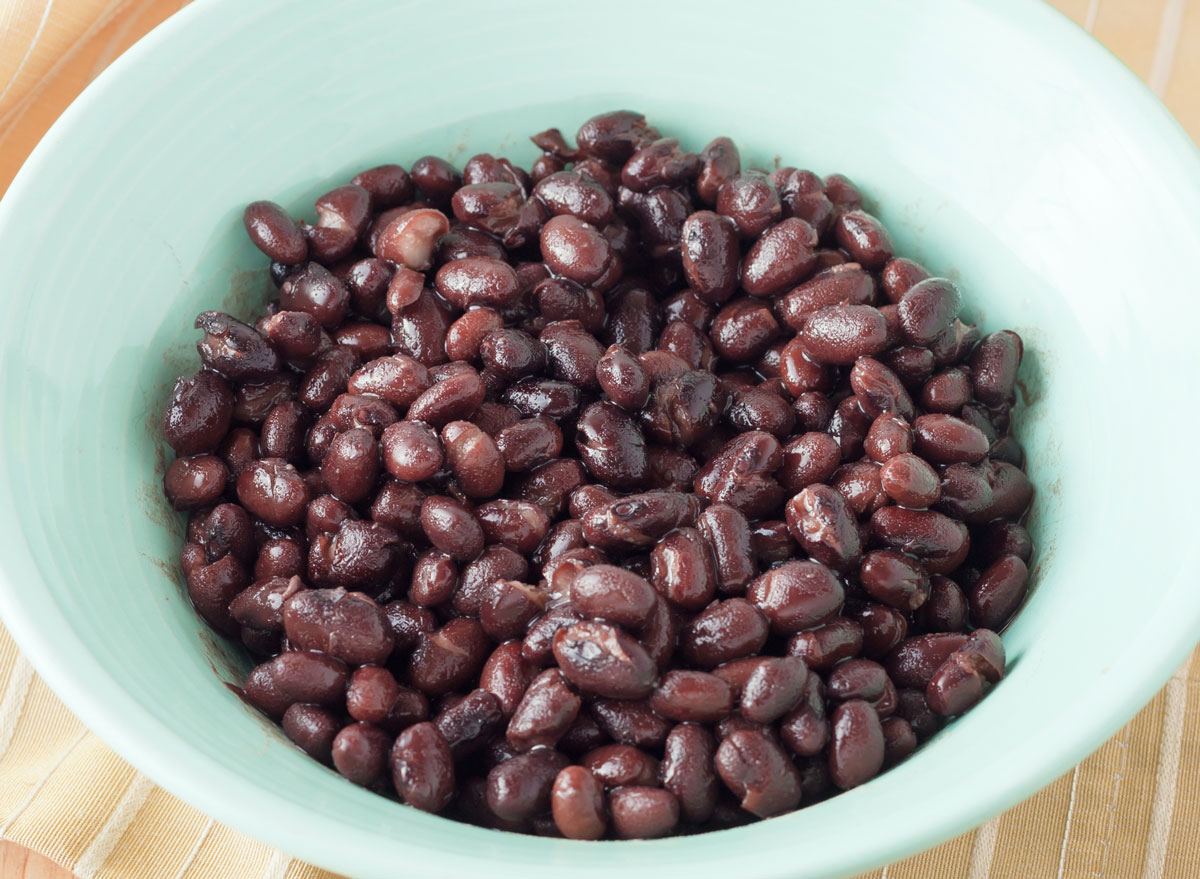
High-fiber black beans promote healthy bacteria in the gut and help prevent constipation. A 1/2 cup serving includes 20 grams of carbs, and 8.3 grams of fiber. A good source of vitamin B6 and folate, beans have been shown to prevent the buildup of the inflammatory compound homocysteine that can damage blood vessels and lead to cardiovascular problems. Black beans also contain quercetin, a natural anti-inflammatory that research suggests may reduce the damage caused by LDL (bad) cholesterol, according to a report in Today's Dietitian. Plus, they're considered The #1 Best Carb To Eat If You're Trying to Lose Weight.
Brown Rice
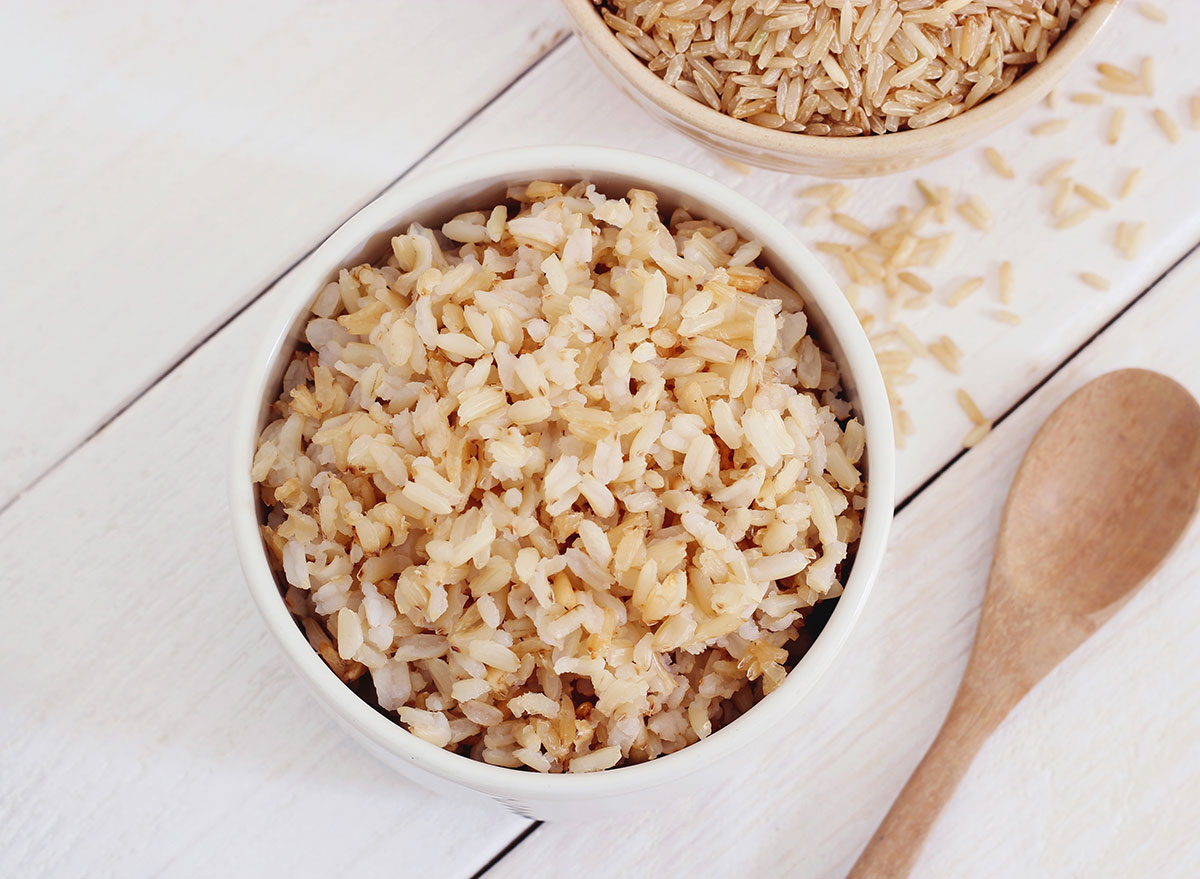
While the carbohydrate in white rice is similar to that of brown rice (45 grams per 1 cup serving), by choosing brown you're also choosing to add in that high-fiber whole grain. This includes 3.5 grams of fiber instead of 0.5 grams in the white rice.
Too bland for your taste? Here's how to spice it up: Cube 4 to 6 ounces of ahi tuna and toss with 3 tablespoons of soy sauce, a tablespoon of sesame seeds, and a diced green onion in a medium bowl. Spoon the mixture over the brown rice.
Chocolate Milk
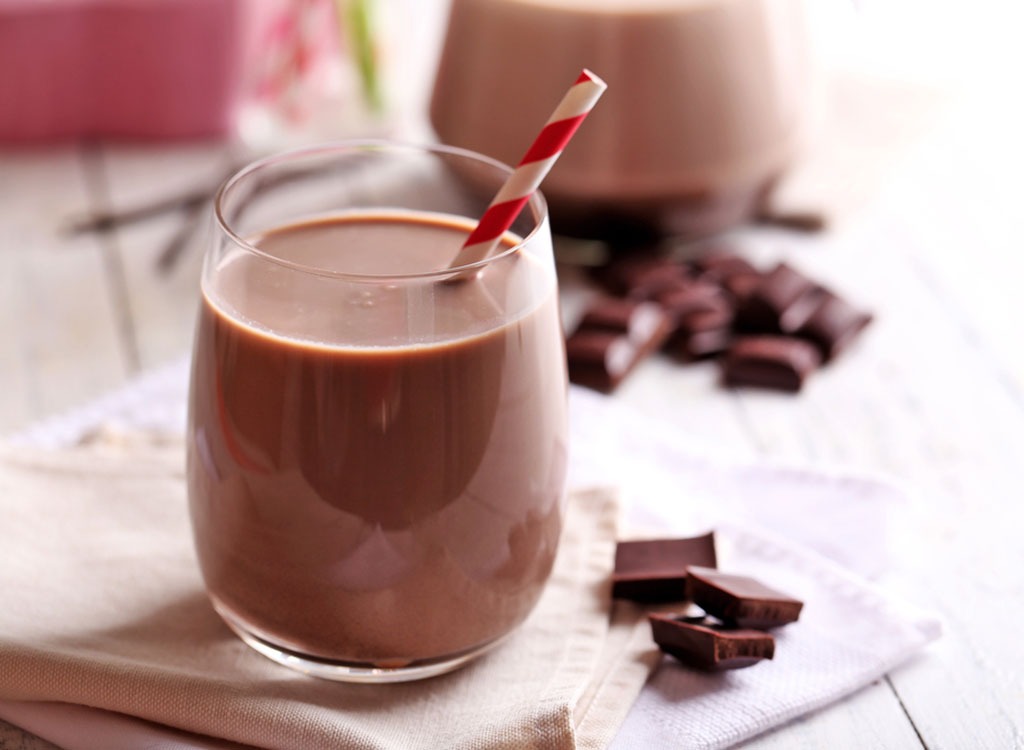
If you exercise vigorously—we're talking about really exerting yourself for such an extended period that you need to drink a recovery beverage or a sports drink afterward—then this high-carb drink may be for you. A report in Applied Physiology, Nutrition, and Metabolism detailed a study in which elite cyclists were given either a standard sports drink designed for exercise recovery or chocolate milk after participating in a vigorous cycling session. Researchers found that those cyclists who drank chocolate milk were able to ride 51% longer in a subsequent workout than cyclists who drank the fancy recovery beverage. An 11 oz. serving of chocolate milk should give you around 36 grams of carbs!
Homemade Trail Mix
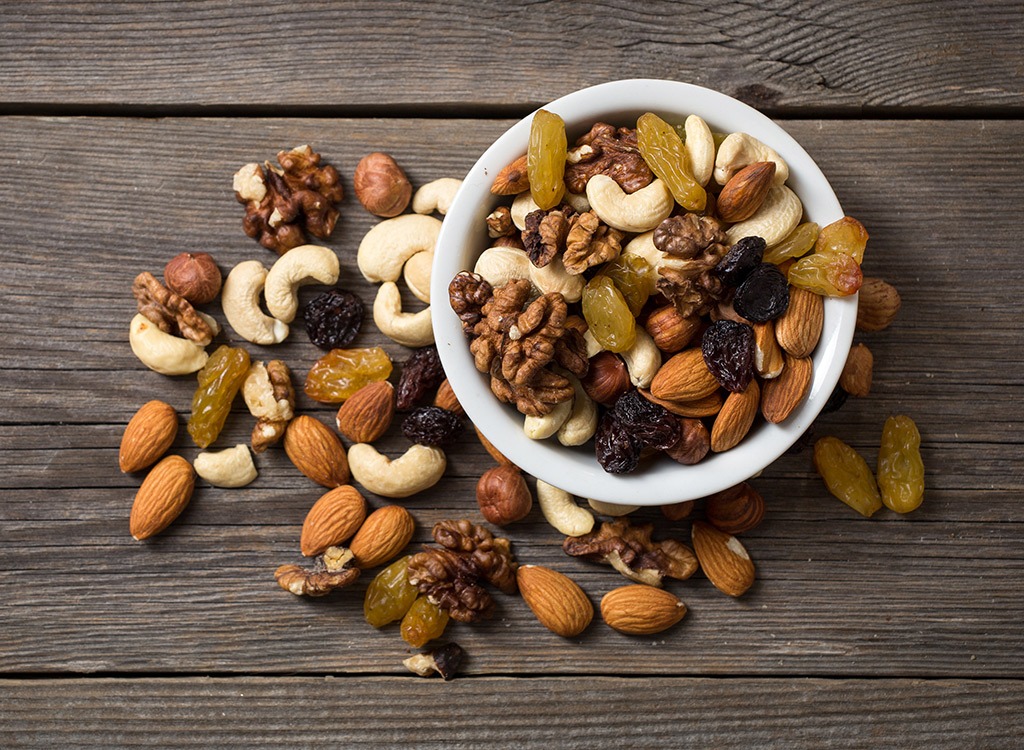
You're eating trail-style energy bars for a mid-morning snack instead of a doughnut. Good for you. But check those nutrition labels; some energy bars are loaded with sugars, some upwards of 29 grams of sugars, making them a carbohydrate mini-meal that can elevate your blood sugar. You can do better—at home—by making a bag of hunger-busting, energizing trail mix that's not loaded with sugar. The carbs in your trail mix will come from dried fruit and a few added crunchies. Grab a baggie and fill it with:
- Nuts: 3 ounces of almonds, peanuts, cashews, walnuts, or pecans (or a combo of any)
- Unsweetened dried fruit: 1/2 ounce of raisins, apples, apricots, blueberries, cranberries, or bananas (or a mixture)
- Seeds: 1 ounce of sunflower seeds or pumpkin seeds
- Crunchies (optional): 1/2 ounce of wasabi peas, pita chips, mini-pretzels, or goldfish crackers
Or try our recipe for Trail Mix Popcorn Recipe!
Kidney Beans
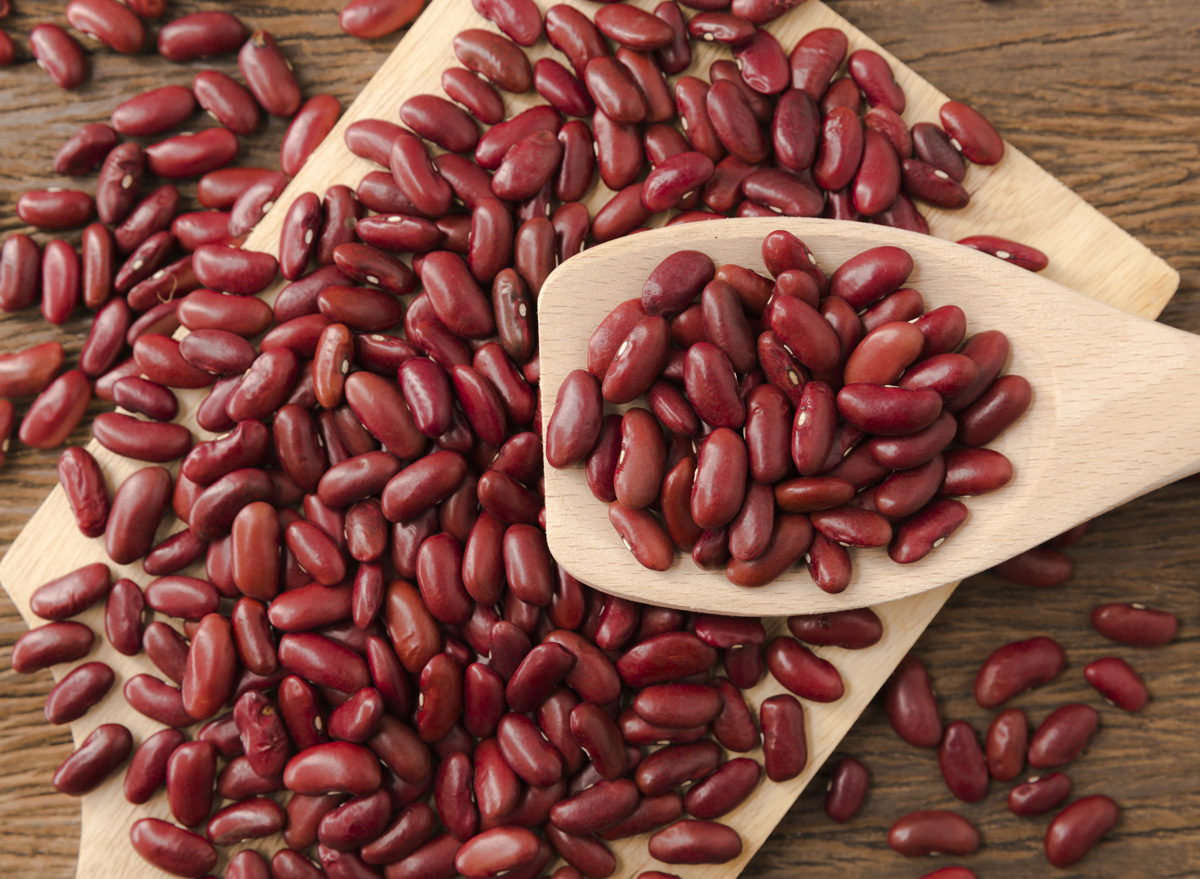
Like most legumes, kidneys are rich in soluble fiber and protein, which reduces the carb impact on your blood sugar, according to the Harvard Health Blog. A 1/2 cup of cooked kidney beans contains 20 grams of carbs and about 6 grams of cholesterol-reducing fiber.
Mango
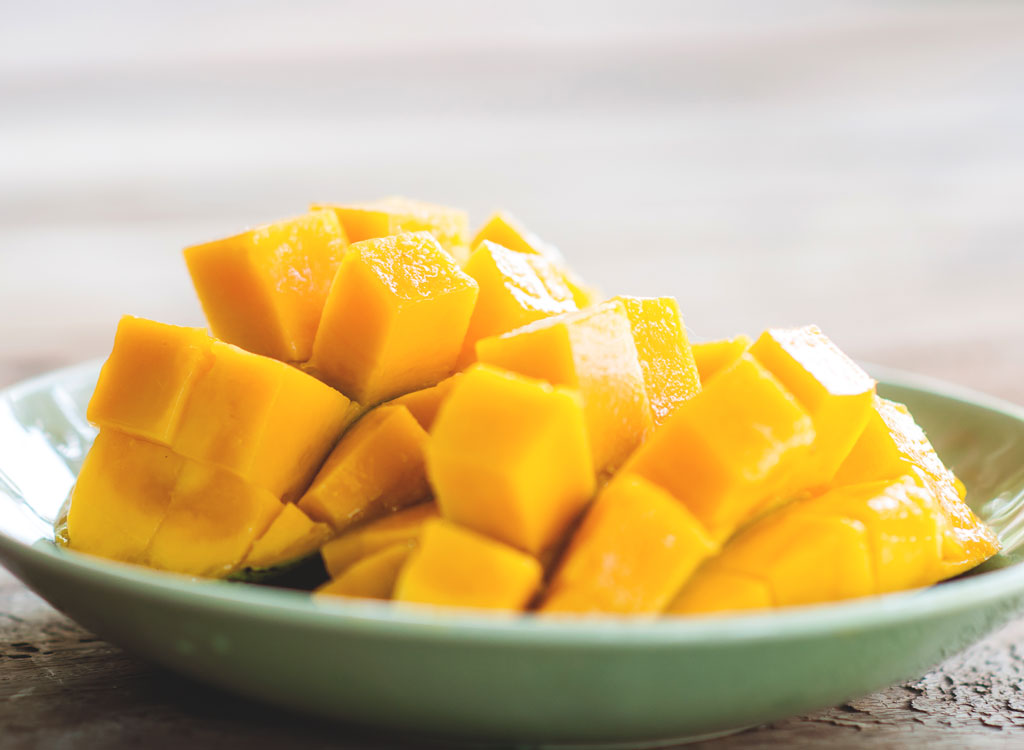
Yes, it's high in sugars (1 cup contains 23 grams), but it's also rich in vitamins and the antioxidants quercetin, isoquercitrin, astragalin, fisetine, galic acid, and methyl gallate. Those strange-sounding antioxidants protect the body against such cancers as breast, prostate, colon, and leukemia. For 1 cup of mango, you're also getting 25 grams of carbs and 2.6 grams of fiber. Plus 100% of your vitamin C daily intake! So boost your morning with antioxidants by making this Golden Mango Smoothie Bowl.
Pears
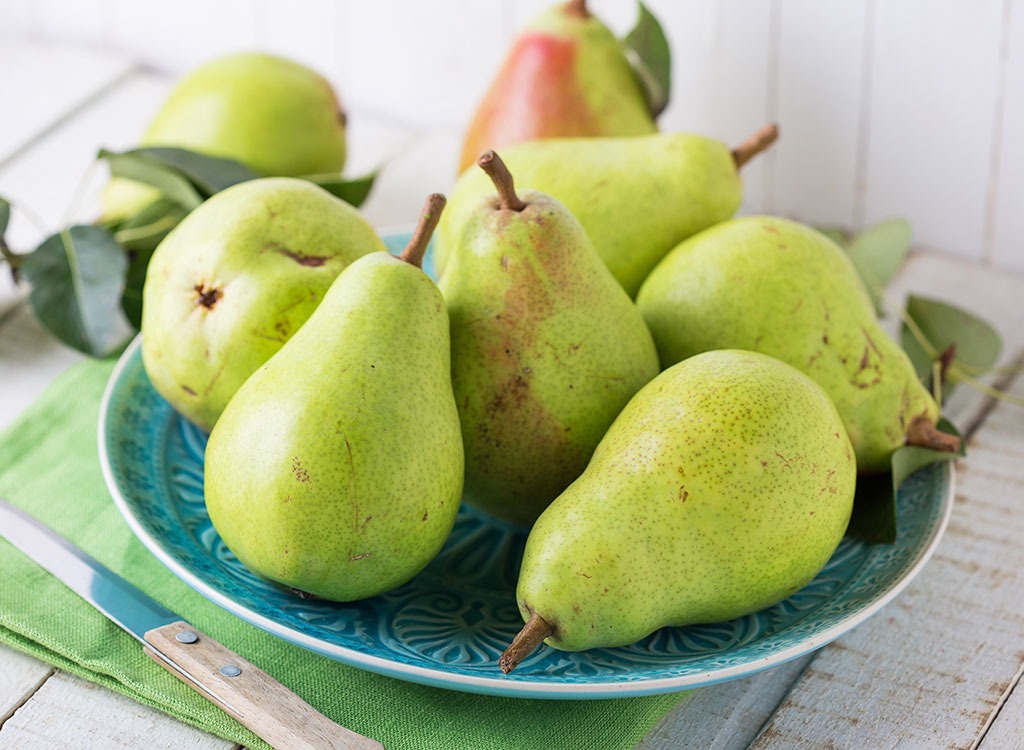
The USDA recommends the average adult male to get 38 grams of fiber per day. Over the age of 50, it drops to 30 daily grams. Either way, that's a lot of fiber, and most men get less than half that amount, according to registered dietitian Katherine D. McManus writing in the Harvard Medical School Health Blog. If you're falling short of those numbers, start eating pears. Just one medium pear with the skin on is enough to fill a quarter of your daily needs of dietary fiber. Pears are very effective hunger busters thanks to the soluble version of that fiber, called pectin that attracts water and turns to gel, slowing down digestion, which may help to reduce blood sugar.
Peas
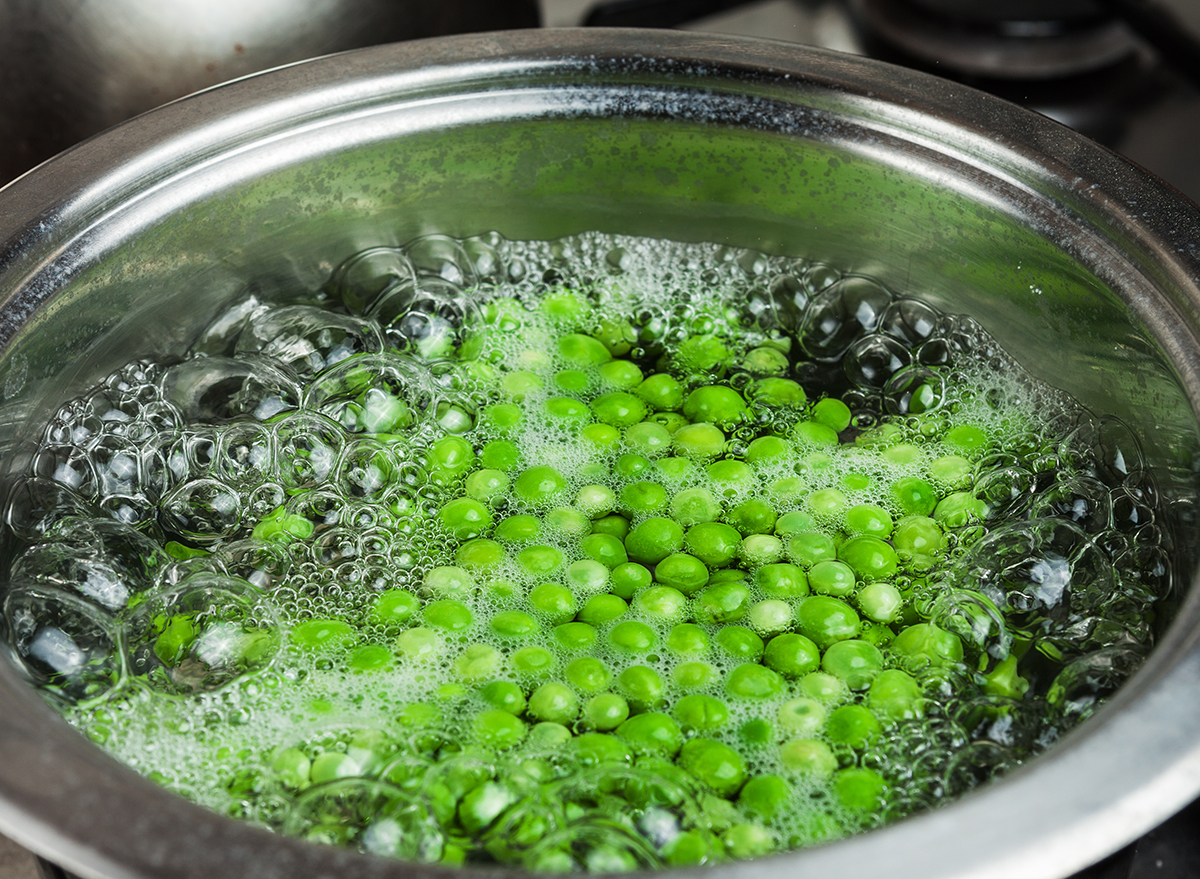
These small green pea (yeah, they're technically legumes) are worth revisiting, men. You ate them as a kid because mom made you. You didn't know, until now, that they are high in protein. One cup contains 8 grams of muscle-building protein and a whole lotta sweetness. Plus, one cup also provides you with 21 grams of carbs and 7 grams of fiber! Peas are also high in vitamin C, giving you 96% of your daily intake, as well as 22% of your vitamin A.
Speaking of muscles and protein, here's How Much Protein You Need a Day to Build Muscle.
Peppers
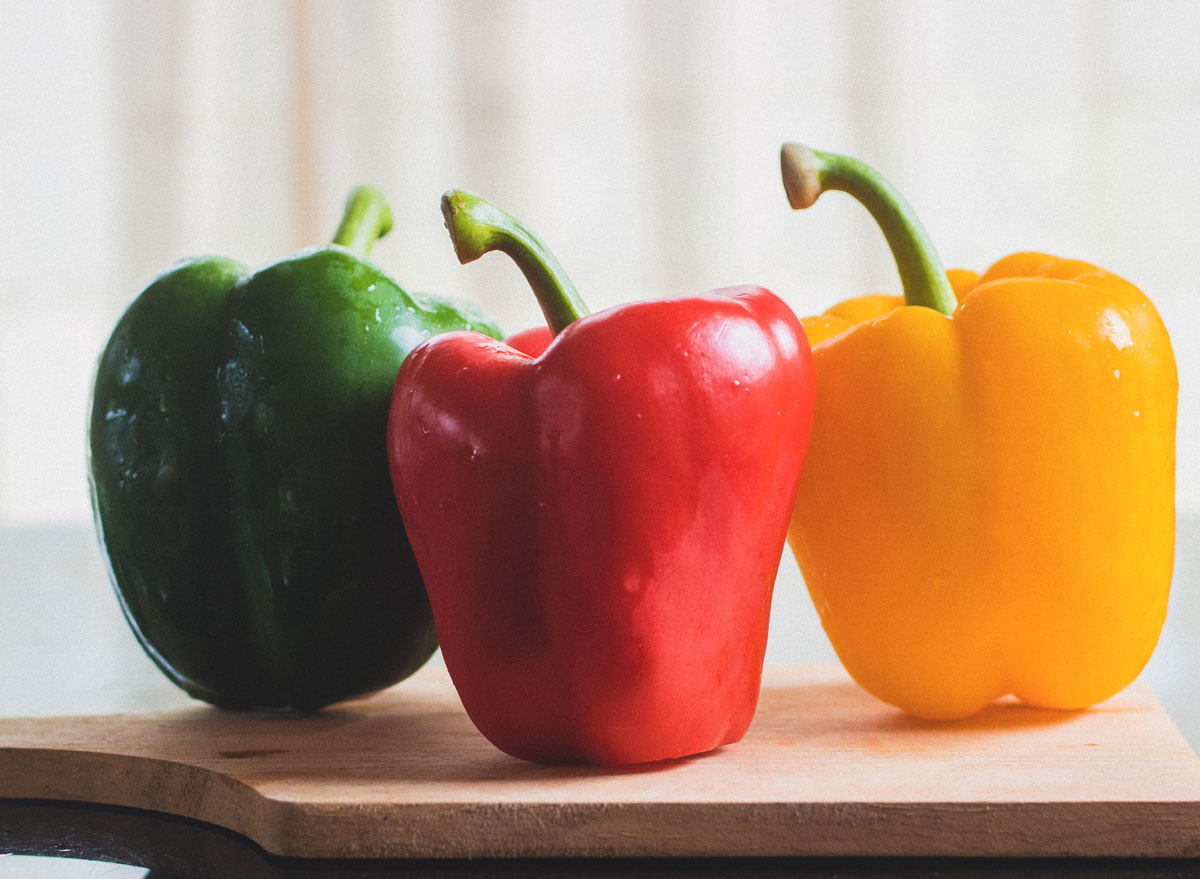
This is another perfect carb for men because its high-water content fills you up for little calorie impact. Red, orange, and green peppers are anti-inflammatory superfoods, but go for red to reap the most benefits. Of the three colors of bells, red has the highest amount of inflammatory-biomarker-reducing vitamin C along with the bioflavonoids beta-carotene, quercetin, and luteolin, which has been found to neutralize free radicals and reduce inflammation.
While the nutrition varies by size and color, a medium-sized red bell pepper will provide you with 7 grams of carbs, 2.5 grams of fiber, and only has 37 calories. Slice up an entire pepper to have as a side with your lunch sandwich and you're getting 253% of your vitamin C intake, and 74% of your vitamin A.
Pineapple

One cup of chunks does contain 16 grams of sugar, but also has 22 grams of carbs and 2 grams of fiber. This tropical fruit will sweeten up your plain plant-based protein smoothies quick so use a small amount. You'll get a boost of vitamins A and C, and the trace mineral manganese that is essential for energy production. You could even use pineapple as a topping for your burgers at home, like these Maui Burgers with Grilled Pineapple.
Purple and Red Grapes
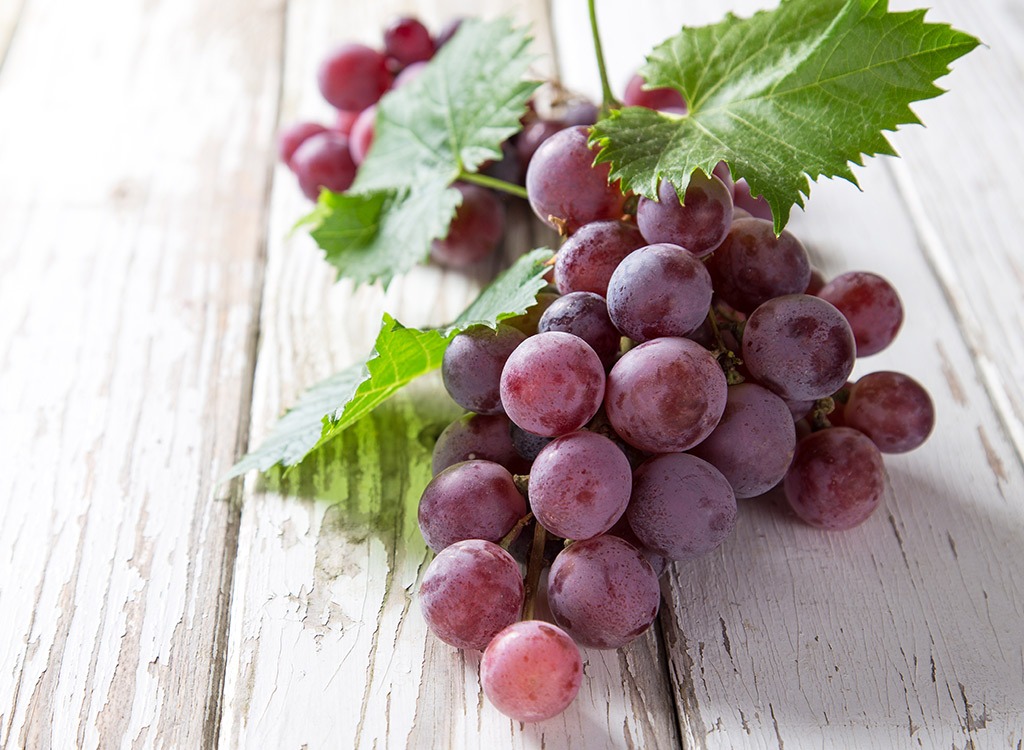
A study in The Journal of Nutrition found that compounds in purple grapes help slow the formation of artery-clogging LDL cholesterol. Also, the anthocyanins and resveratrol in grapes have been shown to reduce inflammation. One cup of grapes includes 16 grams of carbs and about 1 gram of fiber. Although they aren't as high in vitamin C or vitamin A, they are a tasty treat to have as a side for your meals that will satisfy that sweet tooth of yours.
Sweet Potatoes
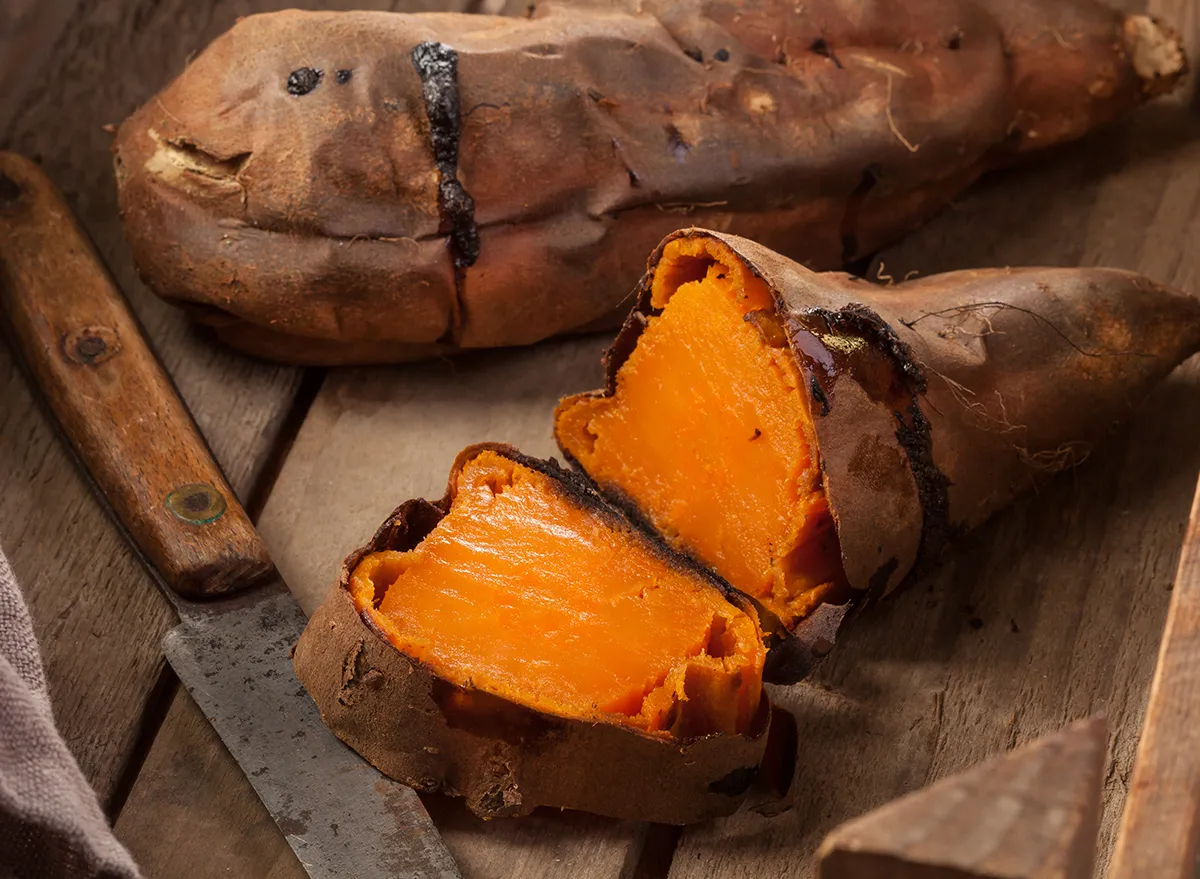
If you're a meat and potatoes guy, elevate the potato over the meat as the main event during dinner. And make your spud a baked sweet potato. Sweet potatoes are loaded with fiber (4 grams per one medium-sized potato), so they digest slowly, keeping your blood sugar stable and your body feeling full longer. Plus, one sweet potato only has 26 grams of carbs and average around 112 calories per potato.
One tip: Start eating the potato—with the skin—first and you'll find you eat less meat. This orange tuber is also rich in antioxidants called carotenoids, which positively impact blood sugar levels and reduce the risk of insulin resistance. It includes 368% of your vitamin A daily intake!
Start adding sweet potatoes to your diet with these 25 Healthy and Delicious Sweet Potato Recipes.
Tart Cherry Juice
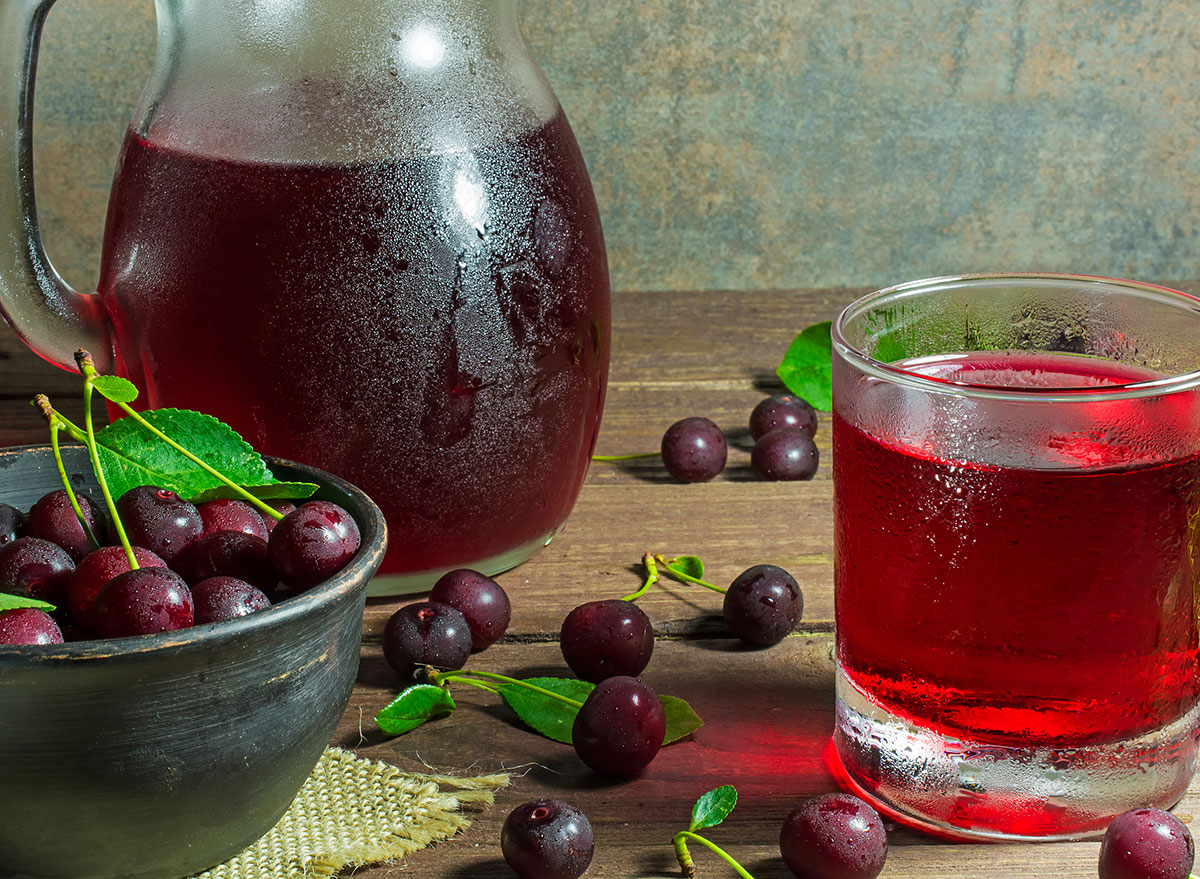
Nutritionists typically caution against drinking a lot of fruit juices, which are highly concentrated sources of sugars. But tart cherry juice is one carb-heavy beverage that men might consider sipping to help control inflammation and maybe even reduce belly fat. Plus, an 8 oz. serving includes 28 grams of carbs and 5 grams of fiber!
Tart cherries are rich in antioxidant compounds called anthocyanins that reduce inflammation. In animal studies published in the Journal of Medicinal Food, rats were fed a high-fat diet and either freeze-dried tart cherry powder or a control diet of equal calories but without the tart cherry addition. Only those fed the tart cherries experienced a 9% reduction in abdominal fat and other markers of metabolic disease. Tart cherries also contain tryptophan, another compound like anthocyanins that help the body produce the sleep-inducing hormone melatonin.
Watermelon
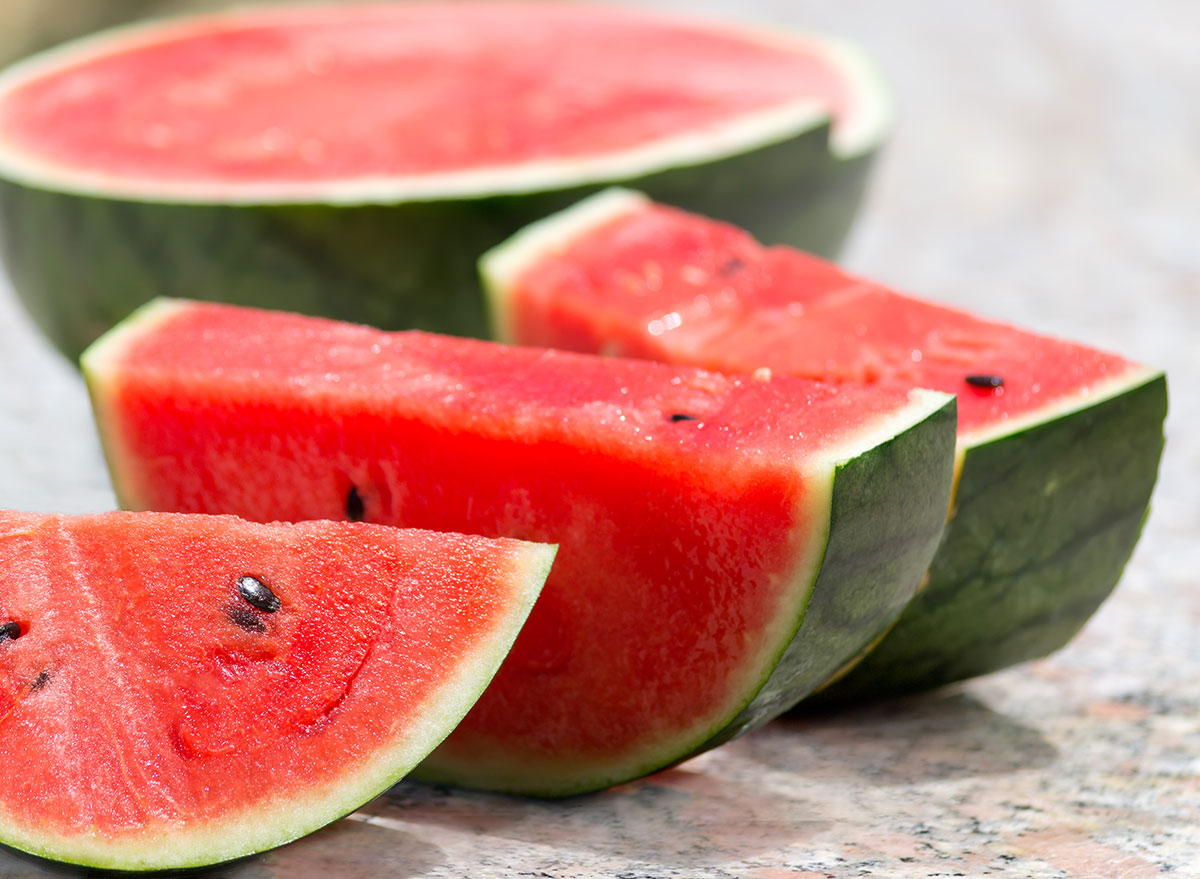
Yes, this fruit is sweet-tasting, but it's mostly, well, water and fairly low in carbohydrates compared to other fruits. One cup of watermelon contains about 11 grams of carbs and 0.5 grams of fiber, and it's loaded with vitamins A, B6, C, lycopene, antioxidants, amino acids, and blood-pressure reducing potassium. It also contains citrulline, an amino acid compound that improves circulation.
Eat some watermelon or drink its juice before a workout: A study in the Journal of Agriculture and Food Chemistry found that athletes who did that reported reduced next-day muscle soreness and a slower heart rate. Here's another benefit of citrulline that gents may appreciate: it converts to L-arginine, which is important for the production of nitric oxide, which in turn increases blood flow, strengthening erections.
Whole Wheat Bread
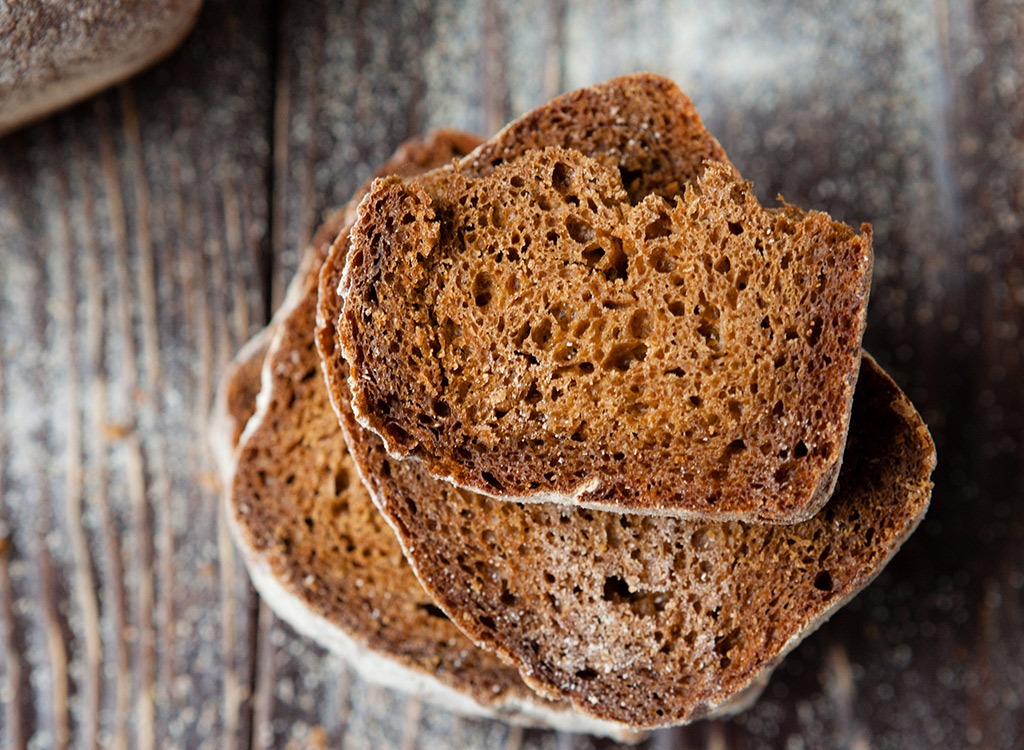
We're going to assume you like sandwiches, and rice cakes don't do much for you. That's fine, because you can make your sandwiches a whole lot healthier by using whole wheat bread instead of the white stuff that's mostly devoid of nutrients. 100% whole wheat bread is made from whole grains; in other words, the bread is made with the fiber-rich outer bran of the wheat, the nutrient-rich central germ, and the middle endosperm.
Not sure what to buy? Here are the 18 Best and Worst Store-Bought Breads, According to Experts.

